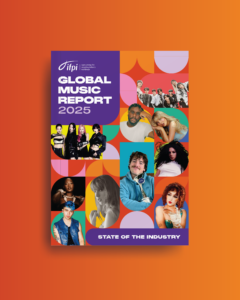 Toronto, 21 March, 2024: Global recorded music revenues reached US$28.6 billion in 2023, an increase of 10.2% year-over-year and the ninth consecutive year of growth, according to the IFPI’s Global Music Report 2024. The report provides a comprehensive annual review of the global recorded music market and analyzes issues and trends facing the industry today.
Toronto, 21 March, 2024: Global recorded music revenues reached US$28.6 billion in 2023, an increase of 10.2% year-over-year and the ninth consecutive year of growth, according to the IFPI’s Global Music Report 2024. The report provides a comprehensive annual review of the global recorded music market and analyzes issues and trends facing the industry today.
Global revenue growth was largely driven by streaming revenues, with subscription streaming increasing by 11.2% and accounting for nearly half (48.9%) of the global market. In 2023, the number of paid subscriptions to music streaming services surpassed 500 million for the first time, with 667 million users of paid subscription accounts globally.
In Canada, the music market grew by 12.19% in 2023 to a total of US$659.6 million, ensuring Canada maintained its place as the 8th largest music market in the world. This growth was largely due to streaming revenues, which saw an 8.6% increase to US$506.8 million. Subscription streaming accounts for the bulk of those revenues, with US$404.2 million, up 10.1% year-over-year. Ad-supported audio streaming was up 4.6% to US$59.1 million, while ad-supported video streaming increased slightly to US$43.5 million in 2023.
“As Canada modernizes the Broadcasting Act and works to bring streaming services into the fold, this report serves as a reminder of the value of these platforms to Canadians. We’re pleased to see more and more Canadians turning to licensed sources to support the artists they love most. We will continue our work to ensure Canadian regulatory frameworks don’t push Canadians to unlicensed listening,” said Patrick Rogers, CEO of Music Canada.
Mirroring a global trend, Canada saw strong growth in other formats too. Physical revenues in Canada jumped nearly 20% (19.9%) year-over-year to US$78.7 million in 2023, with a 30.2% spike in vinyl revenues (to US$56.5 million) accounting for the bulk of that growth.
“The sustained growth of the music market in Canada is due in large part to the efforts of the record companies, whose continued investment in and passion for their artists is propelling them to new heights,” said Rogers.
Commenting on the release of the Global Music Report, IFPI’s Chief Financial Officer and Interim Joint Head of IFPI, John Nolan, said: “The figures in this year’s report reflect a truly global and diverse industry, with revenues growing in every market, every region and across virtually every recorded music format. For the third year in succession, both physical and digital formats grew with a strong rise in the users of paid streaming subscribers – as well as price increases – contributing significantly to total revenue growth.”
While the global growth in licensed music revenues is heartening, the report also highlights the challenges facing the industry – namely, streaming fraud and the abuse of generative AI.
“Music fans greatly value authenticity and our industry has a strong track record of licensing music and supporting the development of new services that create these experiences for fans. That said, we still need effective tools and the support of authorities to tackle unauthorised uses and to ensure the music ecosystem remains one that is sustainable for the long-term,” said IFPI’s Chief Legal Officer and Interim Joint Head of IFPI, Lauri Rechardt.
Music Canada, alongside IFPI, recently worked to shutter a group of nine streaming fraud websites operating in Canada – an example of Music Canada’s continued efforts to protect rightsholders and the integrity of the Canadian streaming marketplace. And as governments around the world consider the implications of generative AI, Music Canada continues to work to ensure human artistry is protected and valued.
“Our industry is excited by the value offered by artificial intelligence, but only when this tool is used responsibly. Fundamentally, we believe that generative AI systems that ingest copyrighted works without authorization are stealing, and Music Canada will continue to push for strengthened policies and frameworks to protect against this,” said Rogers.
The free Global Music Report 2024 – State of the Industry report is now available here.
ENDS
Notes to editors:
About Music Canada
Music Canada is the trade association representing Canada’s major record labels: Sony Music Entertainment Canada, Universal Music Canada and Warner Music Canada. Like its members, Music Canada is a partner to the industry, working with artists, independent labels, publishers, platforms, associations and others, in advancing forward-looking policies to ensure a dynamic and successful Canadian music ecosystem which returns value to music creators.
For further information: Regan Reid, Music Canada, rreid@musiccanada.com, (416) 462-1485
About IFPI
IFPI is the voice of the recording industry worldwide, representing over 8,000 record company members across the globe. We work to promote the value of recorded music, campaign for the rights of record producers and expand the commercial uses of recorded music around the world.
For further information please contact: press@ifpi.org | +44 (0) 20 7878 7979

 In honour of the 50th anniversary of Music Canada’s Gold & Platinum Certification Program, we have teamed up with the JUNOS to create a truly unique ode to the albums and songs Canadians have loved most over the past five decades.
In honour of the 50th anniversary of Music Canada’s Gold & Platinum Certification Program, we have teamed up with the JUNOS to create a truly unique ode to the albums and songs Canadians have loved most over the past five decades.




 Toronto, 21 March, 2024: Global recorded music revenues reached US$28.6 billion in 2023, an increase of 10.2% year-over-year and the ninth consecutive year of growth, according to the IFPI’s
Toronto, 21 March, 2024: Global recorded music revenues reached US$28.6 billion in 2023, an increase of 10.2% year-over-year and the ninth consecutive year of growth, according to the IFPI’s 
 Today, IFPI, the organization representing the recording industry worldwide, released
Today, IFPI, the organization representing the recording industry worldwide, released
Music Canada